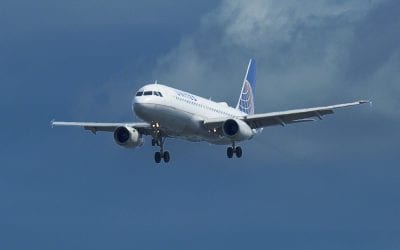The two CEOs of United and Continental Airlines held a press conference to expound on their newly consummated merger or equals. Technically, United is taking over Continental, but operationally, it looks like Continental is taking over United.
These are my first impressions.
Both CEOs were quick to tell analysts and journalists listening in on the conference call that they have a combination of airline routes that barely overlap. Both claimed that their flexible fleet will allow them to better respond to changes in the business climate. Both noted that they now have a more competitive position vis a vis Delta Air Lines and American Airlines. Both spoke of unparalleled synergy in this merger. That is all from the business point of view.
When asked about the hub structure of the combined airlines, the CEOs noted that there would be 10 hubs in the new airline. Specific questions about Cleveland and Houston received very different answers.
Jeff Smisek, CEO of Continental, answered the Cleveland question with an it’s-premature-we’ll-have-to-take-a-look kind of answer. In other words, he really doesn’t know, but he is preparing Cleveland for the worst. His answer was prefaced by a somber commentary about “how much Continental means to the Cleveland market” and “how much Cleveland has meant to Continental.” That being said, between the lines, Cleveland will probably be faced with a less-than-full-hub future. Of course, overcrowding of O’Hare will keep Cleveland in the mix as a mini-hub.
When talking about Houston, both Glenn Tilton of United Airlines and Jeff Smisek were exuberant about the future. They claim that Houston will be the largest hub of the world’s largest airline and that flight operations will increase under the new company. Though many management positions will move to Chicago, the total workforce will more than likely grow under scenarios proposed by United and Continental.
From the consumer point of view, both CEOs claimed that customers will get more choices of more destinations. Tilton and Smisek touted this merger as “pro-consumer.” They claimed that this merger would “add competition” and that because they don’t overlap there would be no increases in airfares or decrease in service.
I’ll take that with a major grain of salt. Consumers already have the benefits of virtually joint frequent flier programs with the Star Alliance operations. There is already an international joint marketing campaign through the Star Alliance. There is already a sharing of airline clubs through the same alliance. So what do consumers get that is any different than the same old stuff?
Undoubtedly there will be a cut in some services. Off the top of my head, I can see that there will be a cut in the New York area to Chicago market. There will be a cut in the Houston to Chicago market. And I haven’t even taken out the overlapping route maps.
Continental will become less passenger friendly. They will become more like United. That will be a loss for the industry. The biggest changes will be faced by Continental workers who will find their future pension plans bleaker and will be faced with the biggest possibility of downsizing or reorganization in Houston and Cleveland.
Anywhere that the primary competition is predominantly between Delta, American and new United, will see an increase in airfares. Through the complex “signaling” systems that airlines use, airfares will increase as demand is decreased.
Time will tell. This is an interesting combination from a consumer point of view.
From an domestic point of view, passengers have already been faced with a reality that Continental and United have been working together through the Star Alliance. Perhaps the combination will allow low cost carriers a bigger window of competition and provide enough economic headwinds to keep domestic prices level.
Internationally, the competition has been long gone because of a liberal antitrust immunity arrangement enjoyed by these carriers and their international partners. Maybe some of these merger synergies will actually improve connections, prices and service.

Charlie Leocha is the President of Travelers United. He has been working in Washington, DC, for the past 14 years with Congress, the Department of Transportation, and industry stakeholders on travel issues. He was the first consumer representative to the Advisory Committee for Aviation Consumer Protections appointed by the Secretary of Transportation from 2012 through 2018.




